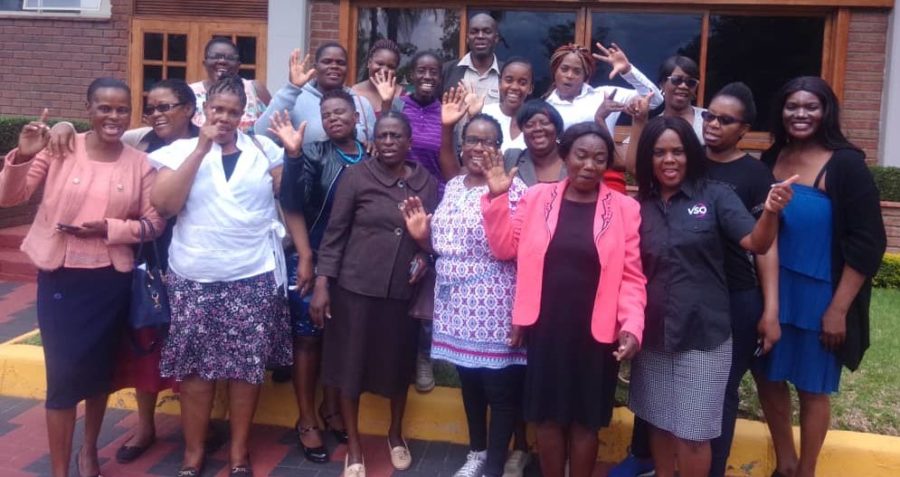Women and girls living with HIV uniting to be heard
 © PAPWC-ZIM
© PAPWC-ZIM
How a national female-led forum is making Zimbabwe’s HIV response more equitable and effective.
In 2017, we established the Zimbabwe Women Living with HIV National Forum (ZWLWHNF) to unite and amplify a diverse range of female voices in the country.
It is incredible how much the forum has achieved over the past three years. From generating female-led research on viral load testing to holding a virtual dialogue on mental health issues, the network is supporting positive women to become increasingly visible and heard. Before this, no formalised network of women living with HIV existed in the country.
As a Zimbabwean woman living with HIV, I know how important it is for our forum to exist. We are building the capacity of women living with HIV to advocate for their rights and needs, with meaningful involvement and leadership in higher-level spaces.
Gender equality in the HIV response
The forum is coordinated by the Pan African Positive Women’s Coalition-Zimbabwe (PAPWC- ZIM), and has around 800 members, who are active in all ten provinces.
I’m proud at how diverse we are. Our members include young women, women with disabilities and women who are particularly vulnerable to HIV, such as sex workers.
We tackle the issues facing women and girls in terms of HIV prevention, treatment, care and support. And we also address sexual and reproductive health and rights, nutrition, economic empowerment, aging and non-communicable diseases, such as cervical cancer. By uniting in a supportive space, it is having a massive impact on our everyday well-being.
Hearing community perspectives
A significant moment came in 2018 when the Global Fund’s community, rights and gender (CRG) initiative funded the PAPWC-ZIM to conduct consultations with women living with HIV in rural areas on engagement with Global Fund processes. We worked in five districts of Mashonaland West province, using local languages and grassroots groups to ensure a wide range of women were included.
A year later, the CRG commissioned us to conduct research on women’s access to viral load testing and other services related to antiretroviral therapy. This was done in coordination with the Ministry of Health and Child Care, the National AIDS Council and the Global Fund’s country coordinating mechanism (CCM).
We worked in seven provinces, interviewing more than 100 women living with HIV, plus health workers. Forum members were recruited as research assistants and trained on research techniques, ethics and data collection. The pride the women felt in contributing to the research was immense – and their new skills mean the forum can conduct other research, led by and for women living with HIV.
The findings suggest awareness of viral load testing is highest among urban women. Respondents reported long delays for results and often having to re-test due to spoiled or lost samples. They also reported limited access to family planning and antiretrovirals shortages.
Support from the Partnership to Inspire, Transform and Connect the HIV response (PITCH) programme through Frontline AIDS, helped us invite national stakeholders to hear the research findings and recommendations in full. Forum members from ten provinces attended – for many, it was their first experience of such an event – plus representatives from the Ministry of Health and Child Care, the CCM , the National AIDS Council, UNAIDS, UNWomen and others. For many of our members, being involved in this event meant a great deal – their voices were finally being heard.
COVID-19
COVID-19 has shown how critical it is to build a health system that can effectively respond to pandemics. The forum has been essential for conveying what COVID-19 means for women living with HIV and how it may affect the sustainability of Zimbabwe’s HIV response.
We have passed on reports of women living with HIV who cannot work due to lockdown and have no money for food. This means they are taking medication on an empty stomach – or not taking it at all – and the prospect of interrupting treatment looms large or has already become a reality.
Mental health
During lockdown the forum organised a virtual discussion on mental health issues facing women living with HIV, many of which have been amplified by COVID-19. Some of the women were sharing their feelings for the first time.
Members reported stigma and discrimination after testing HIV positive, and said this was a major cause of stress and trauma. Some reported losing their job, others reported experiencing abuse from a partner, or feeling guilty after losing a loved one due to AIDS.
Moving forward
Support from the Global Fund, PITCH and other partners has enabled the forum to show the essential role it can play in making Zimbabwe’s HIV response more equitable and more effective. But we lack core funding and are currently operating with limited resources, something we are urgently trying to address.
The last three years have demonstrated the importance of a female-led forum. We will continue to build this movement until all our voices are heard and programmes and services for women living with HIV in all our diversity are led and informed by us.
Tendayi Westerhof is the National Coordinator of the Pan African Positive Women’s Coalition-Zimbabwe.
The Partnership to Inspire, Transform and Connect the HIV response (PITCH) is a joint partnership between Frontline AIDS, Aidsfonds and the Netherlands Ministry of Foreign Affairs
Tags
GenderPITCHThe Global FundUniversal Health Coverage (UHC)Zimbabwe

